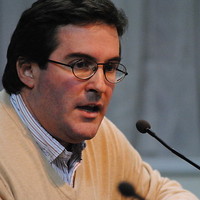- I Lecture on IR Theory and International Politics at Universidad de San Andrés, Buenos Aires, Argentina. My research ... moreI Lecture on IR Theory and International Politics at Universidad de San Andrés, Buenos Aires, Argentina. My research orientation lies somewhere between International Relations and Area Studies, combining Latin American Studies with International Relations Theory. Therefore, I consider myself to be a sort of regionalist-oriented disciplinarist. Upon this perspective, my main research interests revolve around the political and security dimensions of Latin American international relations with a particular interest in Argentina and Brazil's foreign policies.edit
La literatura de Ciencia Política sobre política exterior en Amé- rica Latina es extensa y rica en estudios de casos, pero débil en teoría y trabajos con extensos. Esto ha limitado sensiblemente la comparación entre países y ha reducido... more
La literatura de Ciencia Política sobre política exterior en Amé-
rica Latina es extensa y rica en estudios de casos, pero débil en
teoría y trabajos con extensos. Esto ha limitado sensiblemente
la comparación entre países y ha reducido la capacidad para
identificar en la región regularidades, tendencias y patrones
de política exterior. Así, se cuenta con buenas historias, ricas
en detalles, pero con pocos datos sistemáticos para construir
explicaciones robustas acerca de la política exterior en América
Latina. Buscando corregir este déficit, nuestra investigación se dirige a examinar las orientaciones de política exterior en
América Latina entre 1980 y 2014 en diecinueve países de
América Latina. A partir de juicios, expertos sobre posiciones
de política exterior de presidentes de América Latina estimamos
las posiciones de los presidentes en cuatro dimensiones
de política exterior: estilo de política exterior, orientación
geopolítica, orientación económica y relación con los Estados
Unidos de América. En este texto presentamos el estado de la
cuestión, la metodología utilizada y los primeros resultados
estadísticos agregados
rica Latina es extensa y rica en estudios de casos, pero débil en
teoría y trabajos con extensos. Esto ha limitado sensiblemente
la comparación entre países y ha reducido la capacidad para
identificar en la región regularidades, tendencias y patrones
de política exterior. Así, se cuenta con buenas historias, ricas
en detalles, pero con pocos datos sistemáticos para construir
explicaciones robustas acerca de la política exterior en América
Latina. Buscando corregir este déficit, nuestra investigación se dirige a examinar las orientaciones de política exterior en
América Latina entre 1980 y 2014 en diecinueve países de
América Latina. A partir de juicios, expertos sobre posiciones
de política exterior de presidentes de América Latina estimamos
las posiciones de los presidentes en cuatro dimensiones
de política exterior: estilo de política exterior, orientación
geopolítica, orientación económica y relación con los Estados
Unidos de América. En este texto presentamos el estado de la
cuestión, la metodología utilizada y los primeros resultados
estadísticos agregados
Research Interests:
Research Interests:
El presente trabajo constituye un análisis de las lecturas y percepciones que, tanto Argentina como Brasil, forjaron del mundo, de la región y de su respectiva inserción en tales escenarios. Dichas percepciones y elaboraciones tuvieron... more
El presente trabajo constituye un análisis de las lecturas y percepciones que, tanto Argentina como Brasil, forjaron del mundo, de la región y de su respectiva inserción en tales escenarios. Dichas percepciones y elaboraciones tuvieron lugar a partir de ...
Research Interests:
The opening of diplomatic relations between the United States and Cuba, a momentous change in Latin American regional affairs, raises the question of whether and how the United States will be able to use its new position vis-à-vis Cuba to... more
The opening of diplomatic relations between the United States and Cuba, a momentous change in Latin American regional affairs, raises the question of whether and how the United States will be able to use its new position vis-à-vis Cuba to support political reform and opening there. A potentially critical, yet still largely unexplored, dimension of this question is whether the major Latin American powers can play a bridging role, taking advantage of their efforts in recent years to include Cuba in different regional forums and organizations to provide a pro-reform push at this important new moment. Their willingness and ability to do so is a test of their broader commitment to supporting democracy and human rights throughout the hemisphere.
Research Interests:
Research Interests:
Research Interests:
This article examines the strategic positioning of Brazil in South America and how South America relates to Brazil’s rising status both globally and regionally. It does so from the perspective of international society known as the English... more
This article examines the strategic positioning of Brazil in South America and how South America relates to Brazil’s rising status both globally and regionally. It does so from the perspective of international society known as the English school. This perspective emphasizes how Brazil shares a number of values and institutions with its neighbors that offer the foundations for a distinct regional international society in South America. It thus challenges the materialist stance held by realism which envisages that secondary powers either balance or bandwagon the dominant pole and affirms instead that South America’s strategies towards Brazil are more complex and nuanced than a simple polarity standpoint suggests.
Research Interests:
Research Interests:
Se trata de un capítulo, escrito junto a Juan Tokatlian, que examina los determinantes institucionales y políticos domésticos de la política exterior argentina
Research Interests:
Research Interests:
Research Interests:
How can we define and measure what constitutes a foreign policy in human rights? How is it possible to explain both the activism of a state and its ideological orientation in the international promotion of human rights? What is the... more
How can we define and measure what constitutes a foreign policy in human rights? How is it possible to explain both the activism of a state and its ideological orientation in the international promotion of human rights? What is the empirical evidence found when we try to answer these questions in intermediate states?
